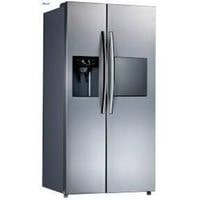What would cause a refrigerator to stop getting cold. The self-contained refrigerator with a compressor located at the bottom of the appliance was invented by Alfred Mellowes in 1916.
Two years later, the product was mass-produced by his company Frigidaire and has since been an indispensable part of our kitchens.
We now take for granted how easy it is to preserve food and beverages cold without much effort; we take for granted how easy it is to keep perishable items fresh at all times.
It will always be necessary to maintain and repair fridges as long as we continue to use them, so knowing how they work can help us diagnose what might be wrong with them sooner rather than later.
What Keeps Things Cool In A Refrigerator
Air gets cold when it loses heat to something else. When air passes through the cool coils of a refrigerator, heat transfers from the air to the coils, so that by the time the air exits the appliance, it is much cooler than before.
This happens because the gas in liquid form transfers heat more efficiently than gas in its gaseous state or solid form.
Kitchen countertops are made from materials such as granite and marble; these kinds of materials are best at retaining heat to keep your kitchen warm, while objects that absorb heat well, like steel, can quickly get too hot to touch.
The place where you keep your butter would have to be made out of something like slate which doesn’t transfer heat well because butter would melt if placed on a surface that keeps butter colder than room temperature.
Reasons Your Refrigerator Won’t Cool
Below are six of the most common reasons why your appliance won’t stay cool, in order of most likely to least likely:
Temperature Control Board Malfunctions: When the refrigerator stops cooling and only runs after repeated taps on the control, it might be time to replace the temperature control board.
The board controls the compressor, evaporator fan, and condenser fan on models with a single-door housing.
Testing that the other components are working is necessary before replacing this part, as replacement is not easy and requires the disassembly of many parts of your fridge or freezer.
A Frosted Over Evaporator: Typically, frost will build upon the evaporator coils inside a refrigerator and will form ice that blocks off the flow of cold air.
This can cause your refrigerator to stop cooling. If you are trying to determine the root of the problem, you can use a multimeter (a device used for measuring electrical current in devices), combine it with a thermometer, and measure the temperature of your refrigerator.
While short-circuiting (turning off), different components related to defrosting, like defrost timer or defrost control board depend on the model of your fridge.
Defective start Relay Or Capacitor: A start relay or capacitor works together with a start winding to control the on/off function of a compressor.
If either one is faulty, it could result in improper cycling or no operation at all. A multimeter can test if a relay or capacitor is electrically active, while a capacitor meter (or a multimeter with a capacitor testing function) will assess whether the component has a suitable capacitance rating for starting the compressor.
Faulty Evaporator Fan Motor: As a result of a malfunctioning evaporator fan motor, cold air will not be circulated into the refrigerator compartment.
If the motor of the refrigerator is unusually noisy or the blades seem badly bent or broken, then you need to replace it with a new one.
You can also use a multimeter to check for continuity in this part of your appliance to see if there is a continuous electrical path. The motor must be replaced if continuity cannot be measured because it is electrically defective.
Condenser Fan Motor Malfunction: Condenser coils may also have trouble dissipating extra heat if a malfunctioning condenser fan doesn’t draw in more cold air past the coils. If the blades on a malfunctioning fan motor either break or fail to rotate freely, then it’s likely that the fan has suffered from some type of mechanical damage; if a damaged blade is overpowered and doesn’t run, then the motor itself has probably experienced electrical failure instead.
Condenser Fan Motor Not Working: Over time, dirt, dust, hair, and other debris may collect on your fridge’s condenser coils.
These components are situated on the back of the machine underneath panels or grills.
This restricts airflow to and from the compressor, which means less heat is being released from the refrigerant, and this can cause your fridge to stop cooling. Clean your fridge regularly using a dedicated brush.
Related Guides
